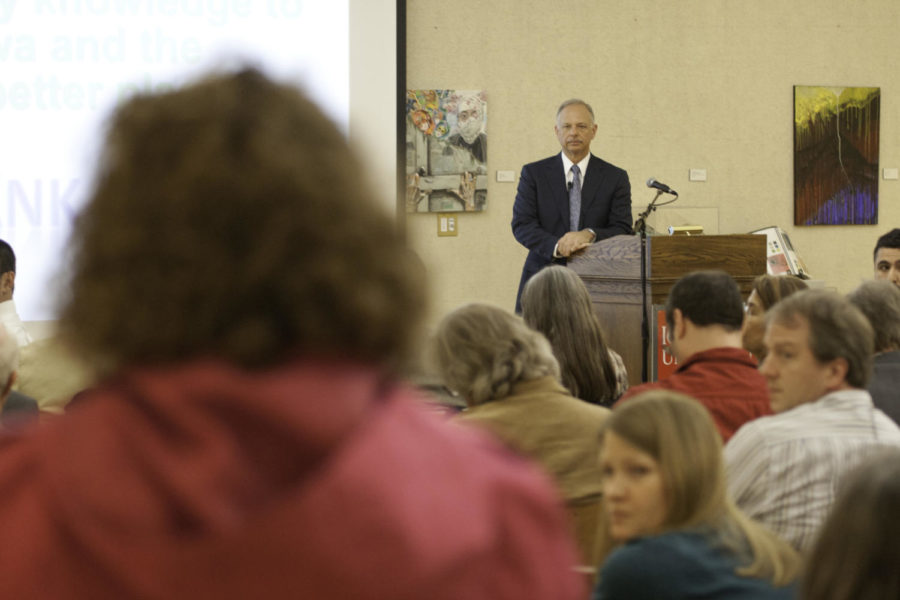Montemagno presents vision for ISU in final provost candidate forum
April 27, 2012
The final candidate for the position of Iowa State University’s new senior vice president and provost presented his vision and ideas for the future at an open forum Friday morning.
Carlo Montemagno, currently the Founding Dean of the College of Engineering and Applied Science at the University of Cincinnati, gave a presentation titled “Iowa State University: From Great to Eminent,” and answered audience questions to a packed house in the Gallery of Memorial Union.
“I feel like I’m at home,” Montemagno said to begin the presentation. He then discussed the challenges he has faced at previous institutions, how they were solved, issues ISU faces and how he could help solve them.
“You have to mold challenges to achieve desired goals,” he said. “Being an eminent university means being recognized worldwide as being the best.”
Montemagno also spoke of Iowa State’s history as a storied land grant university. He said Iowa State and other land grants are instruments of public good, societal equilizers and places of upward mobility that can enable a community to move forward.
“[Land grants] enable the American dream,” he said. “Iowa State is an institution of opportunity.”
Montemagno said that while Iowa State is a great university in great shape, there is still a lot of work to do in terms of promoting the school’s excellence and improving the graduation and retention rates. He said land grants like Iowa State will continue to be centers for societal and economic development, with the key to that being keeping students and faculty here to help realize economic prosperity.
“It will be important to increase academic achievement with limited resources,” Montemagno said, discussing previous hardships he has faced in higher education leadership positions. “We’ll have to eliminate what doesn’t work and invest in things that may cost a little more at first but will yield more improvement.”
He discussed ways that he aligned programs and community engagement efforts enacted at his university, including bridge programs aimed at disadvantaged students, summer programs for children and adolescents and science programs for the whole family.
“These were done in times of budget decreases but still produced results on limited funds,” Montemagno said. “We’re preparing students for 40 year careers, and these types of programs were created to provide that depth.
Montemagno also said he would like to inspire some intercollegiate competition here at Iowa State to showcase students’ ingenuity and engage them in new ways to create students that are multidimensional agents of change.
The importance of nurturing a personal and professional ethical culture was also a key component to the plan discussed. Montemagno said that he helped institute a student honor code where 86 percent of the student body voted on the content, showcasing the importance of student involvement in policy processes.
Faculty development is also key to this, he said, where awards and honors earned by members are touted, support is provided, and graduate students are rewarded for their excellence. Partnerships with research, industries and governmental agencies will also be important in this vision, he said.
“We’re at a turning point for changing old industries to new and looking for the next visionary,” Montemagno said. “The path to achievement includes a long-term commitment to quality, the willingness to alter behaviors and support each other and change. Truth, honesty, trust, selfless risk taking, new ideas, and mentoring are all necessary behaviors, and ISU already has many of them.”
Questions raised by audience members included the topics of earning tenure status for faculty, the role support staff play in a university (“They run an institution,” he said) and what he envisions for the future of university libraries.
The role of graduate students in excellence initiatives was also discussed, with Montemagno saying he would create standing committees for students of all levels, and by meeting with them at regular intervals, they will have the ability to provide input on policies and participate in the decision making process.

















